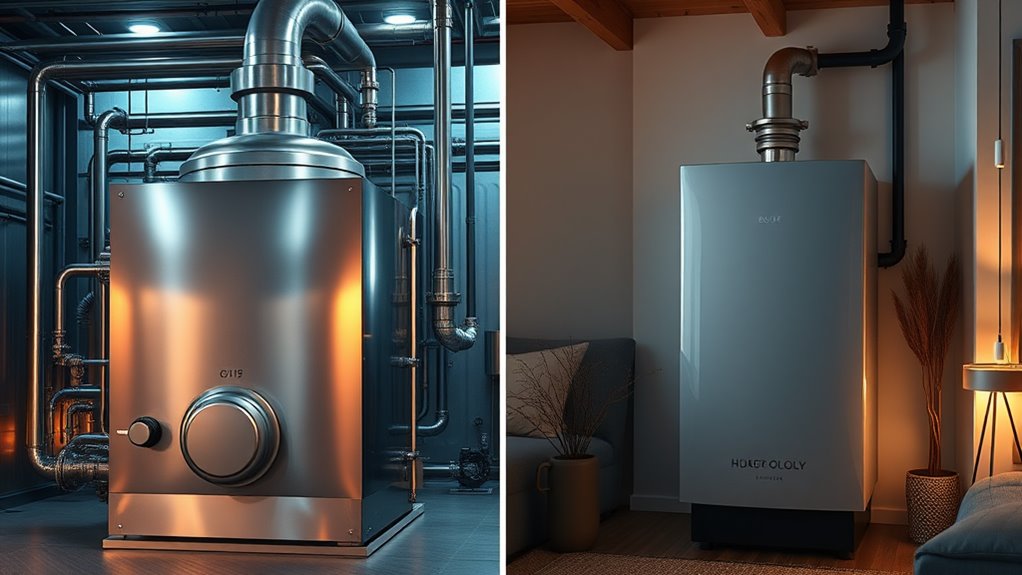Commercial and residential boilers differ mainly in size, capacity, and construction. Commercial units are larger, often exceeding 1,000,000 BTUs, while residential models range from 30,000 to 150,000 BTUs. The materials used are more robust for commercial boilers to handle high pressures. Efficiency ratings also vary; commercial boilers typically exceed 90%, while residential ones range from 80% to 90%. Understanding these differences can help you make informed decisions about heating systems, leading to further insights into efficiency and maintenance.
Key insights
- Commercial boilers have larger heating capacities exceeding 1,000,000 BTUs, while residential boilers range from 30,000 to 150,000 BTUs.
- Residential boilers are designed for individual homes with simpler interfaces, while commercial boilers include advanced controls for larger facilities.
- Commercial boiler construction uses robust materials like stainless steel or cast iron, whereas residential models focus on lighter, space-saving designs.
- Efficiency ratings for commercial boilers typically exceed 90%, while residential boilers range between 80% to 90%.
- Maintenance needs differ; commercial boilers require rigorous upkeep for high-capacity operations, while residential boilers focus on cost-effective energy use.
Key Differences in Size and Capacity
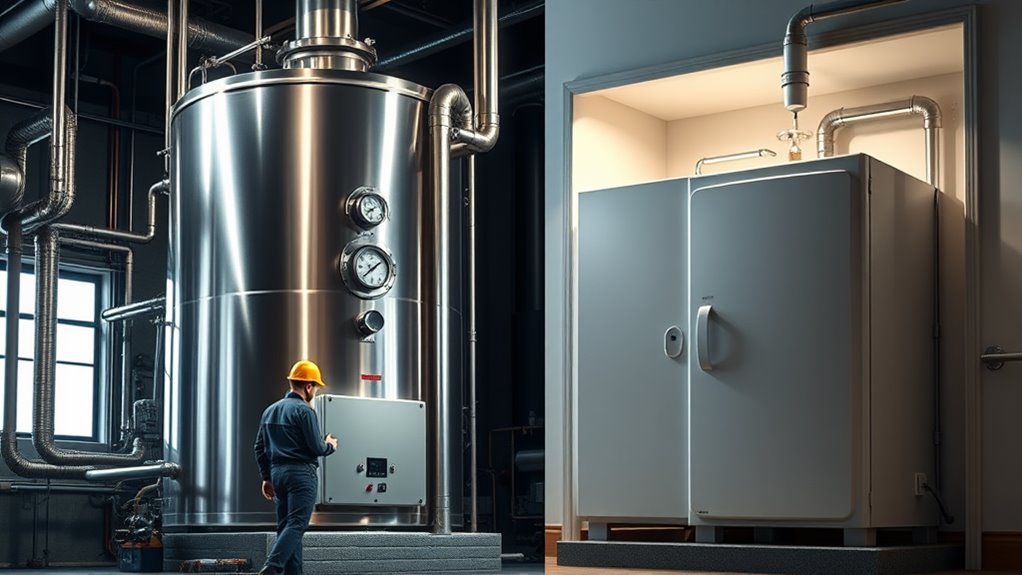
When comparing commercial and residential boilers, size and capacity are essential factors that set them apart. Residential boilers typically feature smaller boiler dimensions, designed to meet the heating output needs of individual homes. In contrast, commercial boilers have larger dimensions to accommodate significant heating requirements for businesses or industrial spaces. Their heating output is often measured in BTUs, with residential units generally ranging from 30,000 to 150,000 BTUs, while commercial units can exceed 1,000,000 BTUs. This difference in size and capacity guarantees that each type of boiler effectively meets its intended application. Understanding these distinctions helps you choose the right boiler for your specific requirements, guaranteeing efficiency and performance in your heating solutions. Additionally, the selection of appropriate boiler is crucial to ensure that the system aligns with the building size and heating needs.
Design and Construction Variations
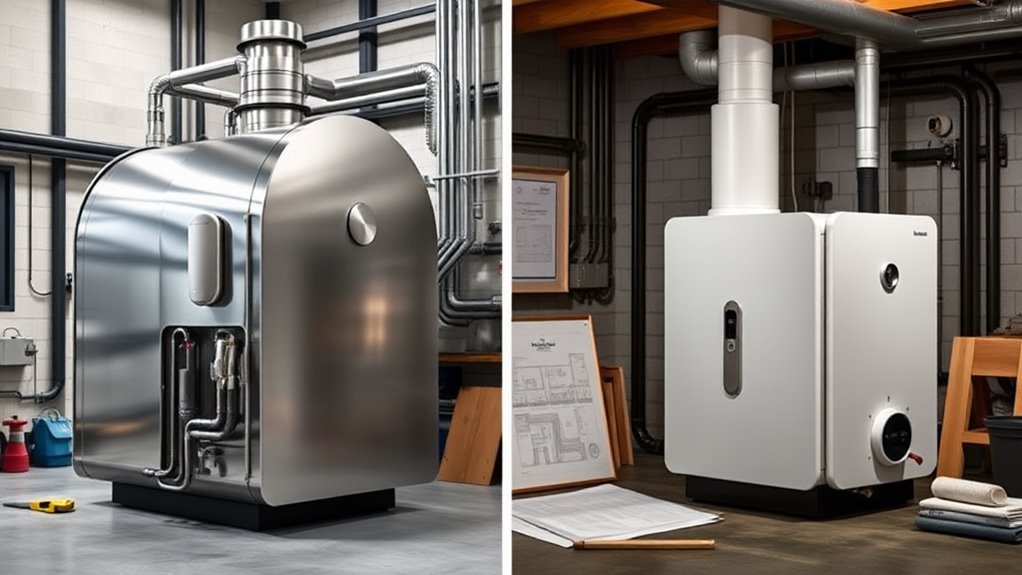
While both commercial and residential boilers serve the same fundamental purpose of heating, their design and construction exhibit significant variations tailored to their specific applications. Commercial boilers typically use robust boiler materials, such as stainless steel or cast iron, to withstand high pressures and larger heating demands. In contrast, residential boilers often utilize lighter materials, focusing on efficiency and space-saving designs.
Design specifications for commercial units often include multiple heating elements and advanced control systems to guarantee consistent performance across larger spaces. Residential models, however, prioritize simplicity and user-friendly interfaces. Overall, these differences in materials and specifications reflect the distinct operational needs and regulatory requirements inherent to each type of boiler. Additionally, commercial boilers require regular commercial boiler service to ensure safe and efficient operation, which is less common in residential units.
Efficiency and Performance Factors
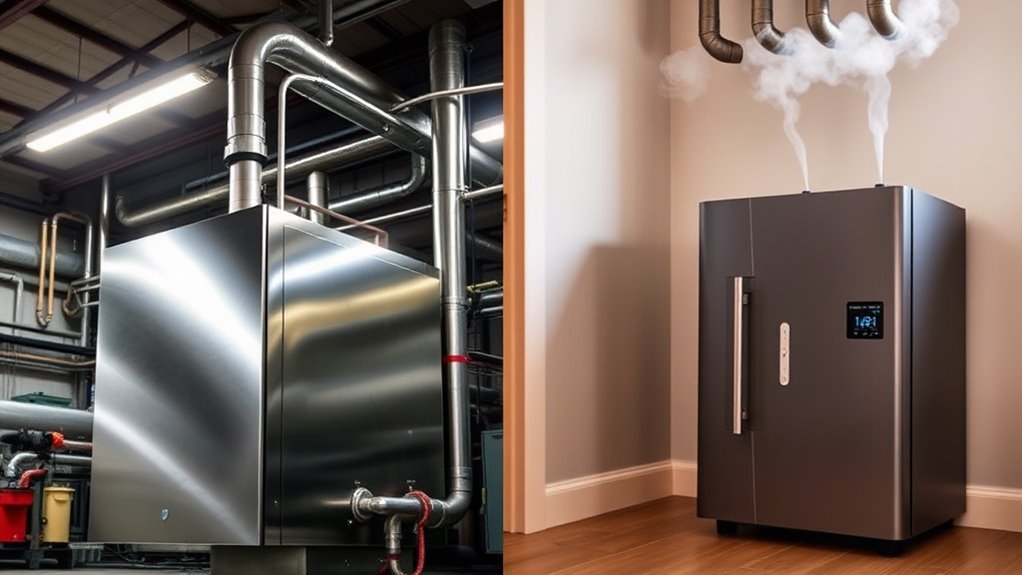
Efficiency and performance factors play an essential role in distinguishing commercial and residential boilers. When evaluating these systems, you'll notice significant differences in efficiency ratings. Commercial boilers typically achieve higher efficiency ratings, often exceeding 90%, due to their advanced technology and larger scale operations. In contrast, residential boilers may range between 80% to 90% efficiency, tailored for smaller heating demands. Performance metrics, such as heating output, response time, and fuel consumption, also vary greatly. Commercial units are designed for high-capacity needs, ensuring consistent performance even under peak loads. In contrast, residential boilers focus on optimizing energy use for smaller spaces, balancing efficiency with cost-effectiveness. Understanding these factors is vital for selecting the right boiler for your specific needs. Additionally, modern systems are designed for reduced energy consumption, contributing to lower operational costs and supporting environmental sustainability.
Maintenance and Operational Considerations
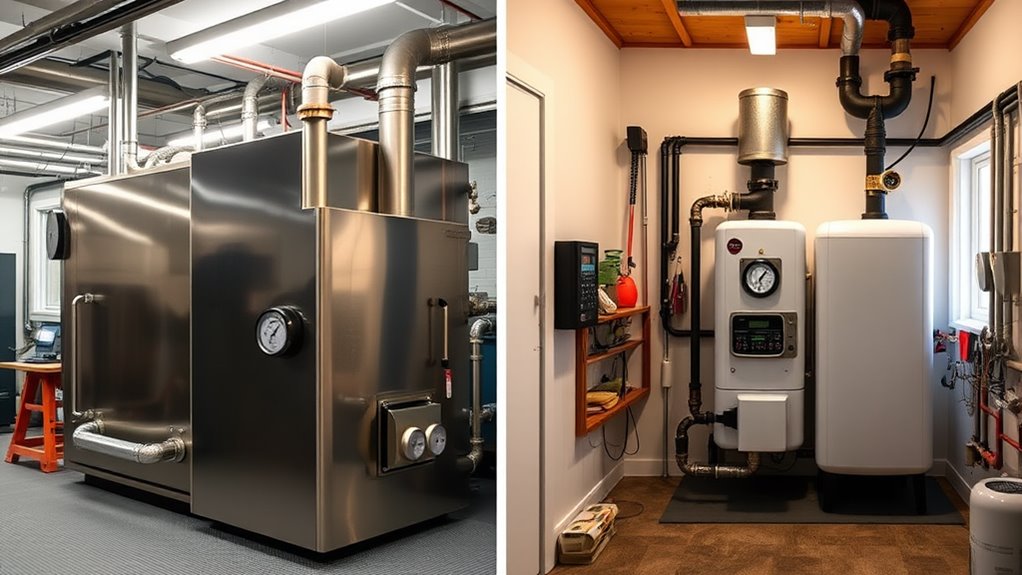
Proper maintenance and operational considerations are vital for maximizing the lifespan and efficiency of both commercial and residential boilers. Regular boiler upkeep, including routine inspections and timely repairs, prevents minor issues from escalating into costly failures. Pay attention to water quality, as impurities can lead to corrosion and inefficiency. Additionally, make sure that safety controls and pressure settings are routinely checked to avoid operational hazards. By implementing a proactive maintenance schedule, you can greatly reduce operational costs associated with energy consumption and emergency repairs. Understanding the specific maintenance requirements of your boiler type enhances its reliability, guaranteeing peak performance while minimizing downtime. Prioritizing these considerations ultimately leads to a more efficient heating system, regardless of whether it's a commercial or residential unit. Moreover, regular maintenance of boilers contributes to overall energy efficiency and reduces operating costs.
Applications and Usage Scenarios
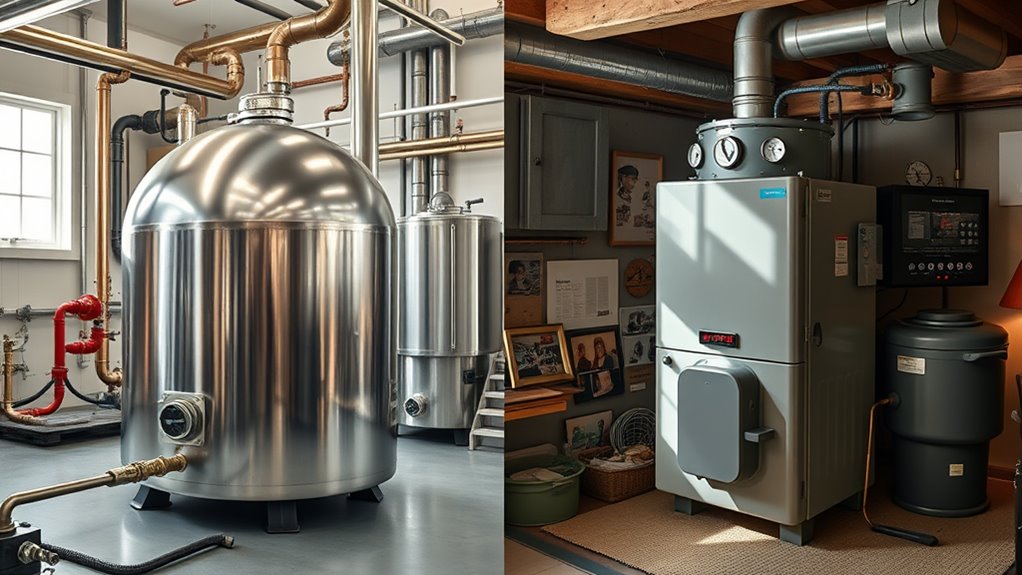
When selecting between commercial and residential boilers, it's crucial to evaluate their specific applications and usage scenarios, as each is designed to meet distinct heating demands. Commercial boilers are typically used in industrial settings where high capacities and efficiency are required, such as factories, hospitals, and large office buildings. These systems handle significant heating requirements, enabling consistent and reliable temperature control in expansive areas. On the other hand, residential boilers cater to smaller-scale heating needs, primarily in homes and small apartments. They focus on efficiency and user comfort, offering adequate heating without the complexities found in commercial units. Understanding these applications guarantees you choose the right boiler type to effectively meet your heating needs. Additionally, commercial heat pumps provide energy-efficient heating solutions that can further enhance operational costs.
Frequently Asked Questions
What Is the Average Lifespan of a Commercial Boiler?
The average lifespan of a commercial boiler typically ranges from 15 to 30 years, depending on factors like usage and maintenance. Regular boiler maintenance is essential to guarantee peak performance and longevity. You should also consider efficiency ratings when selecting a boiler, as higher ratings often correlate with better energy savings and durability. Proper care and timely inspections can greatly extend your boiler's life, maximizing its efficiency and reliability throughout its operational years.
Can Residential Boilers Be Used for Commercial Purposes?
You can't typically use residential boilers for commercial purposes due to significant commercial limitations. While residential applications can handle lower heating demands, commercial settings require higher capacity and efficiency. Residential boilers lack the robustness needed for larger spaces, which can lead to inadequate heating and potential system failures. As a result, it's essential to choose the right boiler type based on your specific needs, ensuring efficiency and reliability in your heating system.
What Are the Common Fuel Types for Each Boiler Type?
Common fuel types for boilers include natural gas, oil, propane, and electricity. For both residential and commercial units, fuel efficiency is vital to minimize operational costs. Natural gas is often favored due to its efficiency and lower emissions. Regular boiler maintenance is essential regardless of the type, ensuring peak performance and longevity. By choosing the right fuel and maintaining your boiler, you'll enhance efficiency and reduce downtime, benefiting your overall system.
How Do Local Regulations Differ for Commercial and Residential Boilers?
Local regulations for boilers vary considerably based on whether they're commercial or residential. You need to guarantee regulatory compliance, as commercial boilers often face stricter safety standards due to their size and usage. Residential boilers typically follow less stringent regulations, focusing on efficiency and safety, but you still must adhere to local codes. It's crucial to understand your area's specific requirements to avoid potential penalties and guarantee safe operation.
What Is the Cost Difference Between Commercial and Residential Boilers?
When considering the cost difference between commercial and residential boilers, you'll find that commercial units typically have higher initial boiler installation costs due to their larger size and complexity. Maintenance costs also tend to be greater for commercial systems, as they require specialized service and more frequent inspections. In contrast, residential boilers usually involve lower upfront costs and simpler maintenance, making them more budget-friendly for homeowners. Understanding these factors can help you make an informed decision.
Summary
In conclusion, understanding the differences between commercial and residential boilers is essential for selecting the right system for your needs. Their size and capacity, design and construction, efficiency, maintenance requirements, and specific applications all play critical roles in performance. By analyzing these factors, you can guarantee ideal heating solutions that meet your operational demands and efficiency goals. Making an informed choice not only enhances comfort but also contributes to long-term cost savings and system reliability.

